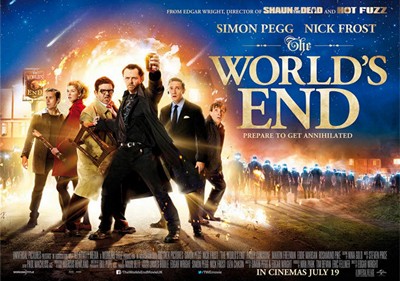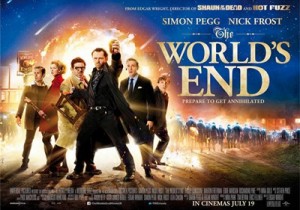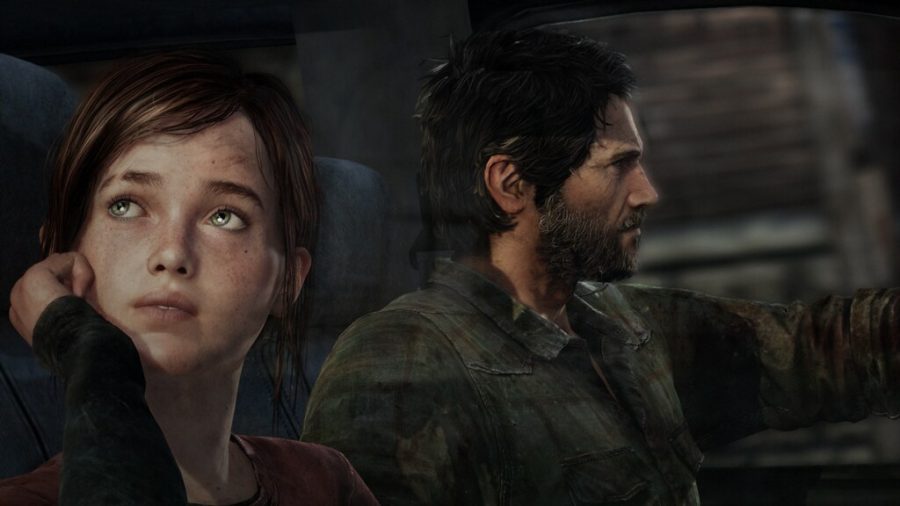The World’s End
Director: Edgar Wright
Writers: Edgar Wright, Simon Pegg
Starring: Simon Pegg, Nick Frost, Paddy Considine, Martin Freemen
Release Date: Aug. 23, 2013 (US), July 19, 2013 (UK)
I harbor no shame or secrets in the statement “I live for the world of cinema.” Without it, life would be a seemingly dim-lit blub of excitement for this reviewer. So it’s no surprise that I feverishly waited for British-born director Edgar Wright’s fourth picture to be unleashed on US soil. The film, appropriately titled The World’s End, seemed up my alley. Promising a blend of comedy and science fiction infused in the guise of a coming-of-age tale, I counted down the days until the film’s release. My ocean of anticipation was also flooded with the fact that the film is part of a loose trilogy entitled The Three Flavors Cornetto trilogy, also known as the Blood and Ice Cream trilogy; I adore the previous two entries. So before the real world comes to an unexpected end, let’s go to Newton Heaven as I review 2013’s intoxicating The World’s End.
Synopsis: Set in the quaint town of Newton Heaven, five friends reunite after twenty years to attempt the town’s legendary pub crawl which culminates at “the world’s end”, a feat the group had failed to accomplish in the heyday of their youth. As the gang arrives, they soon realize that things aren’t how they remember or what they seem. The town’s people, including many faces from their youth, have been replaced with robot doppelgangers. With every passing gulp, the men must try and solve the secrets in Newton Heaven or civilization will reach “the world’s end.”
Direction:
Much like the other two sweet installments of the Cornetto trilogy, Wrights’ Shaun of the Dead (2004) and Hot Fuzz (2007), The World’s End is another fine example of the director’s talents. The film is handled with a certain kind of confidence that I truly believe is a rarity in filmmaking; he is in the elite group of filmmakers working today. While The World’s End isn’t the brightest example in his growing filmography, the picture is still a talent-filled, assured experience.
One example of Wright’s talent comes immediately after the film’s opening. The movie opens with our dysfunctional hero, Gary King, informing a group of people about the greatest night of his life: the original pub crawl attempt to reach The World’s End. A flashback from that night features narration from star Simon Pegg. The five-minute flashback is the entire set up for the remainder of the movie.
What follows is some talented filmmaking. The scene features moving shots, each showcasing all five of the guys in their current everyday life. Those images, along with the music the production chose, really mesh together quite nicely. This gives the audience the idea that these characters have certainly been the masters of their own destiny and have lived life as normal. If only they knew what awaited them in the confines of their childhood town.
Not only does The World’s End feature Wright’s patented quick cuts that establish a scene in four- to six- cuts of film lasting one- to three- seconds a piece, the film also has beautiful fight choreography as well. As the night progresses for the five musketeers, the group is forced to battle with the robots or, as the group quickly dubs, “blanks.” What ensues between the two sides is nothing short of highly entertaining. It’s no surprise, seeing as the fights were staged by long time Jackie Chan-collaborator Brad Allen. Director Edgar Wright is no stranger to highly stylized fight visuals, as Allen and himself worked on Wright’s third feature, 2010’s vastly underrated Scott Pilgrim Vs the World. Both films’ stunt work is breathtaking and very pleasing to the eye. Either way you drink, there is superb direction in The World’s End.
Acting:
The World’s End has no shortcomings in the thespian department. Simon Pegg gives his best performance to date, playing the former leader of the group Gary King. Pegg, co-writer of the Cornetto trilogy with long-time friend Wright, plays King with a zest of social- and self- ignorance but a hint of internal shame. King was, in their childhood days, the coolest guy Newton Haven had ever witnessed. The rest of the gang looked up to Gary as if he were literally a god among mortals. Flash forward twenty years later and the King is still king, but only to himself. Everyone else has moved on, jogging along the mature path to growth and a healthy existence; Gary is running in place.
One scene in particular that showcases Pegg’s talents comes near the film’s climax. King, who has been resilient with finishing the crawl in the face of a robot invasion, comes to blows with his best friend in the picture Andy Knightly. Knightly, played by frequent collaborator and Cornetto trilogy co-star Nick Frost, does well showing pent-up aggression towards King. Knightly has had enough of King’s antics, a situation that’s been boiling for years, and the two come to blows. What ensues is some really fine acting, especially by the emotional Pegg, as his character pleads with Andy about the injustices done unto to his ego and the reality that has become his life.
In addition to Pegg and Frost, The World’s End showcases a slew of incredible characters and performers. Martin Freeman is filled with wit playing the now real-estate agent Oliver “O-Man” Chamberlain and Paddy Considine is clever playing the hyper-aware, looking for love Steven Price. All the actors deserve more than a 15 percent tip for their performances in The World’s End.
Writing:
Unfortunately the writing in The World’s End is where the film struggles, though the first half of the film is written quite well. Wright and Pegg move the story along quickly, and do pretty well, but not perfectly with giving every character in the story a sense that they have their own wants and desires. But then there are the bad, and the awful, aspects of the script.
The first problem I had with the script came at a pivotal scene halfway through the pub crawl. A character is introduced to give the viewer explanation of this town and the current situation of a robotic invasion. A character pulls Steven aside to tell him the truth but grabs the wrong character, not a mistake by the character in question but one of the writers. The character receiving the information isn’t Gary King. Steve is a side character, though important to the story but one none the less.
With this, Gary can’t have change. He can’t grow. But with the ending, I suppose he shouldn’t. I don’t want to spoil it for any who intend to see the film, but the ending is horrendous. It takes the film from a B+ to almost a –B. These, along with the underdeveloped interpersonal character connections in favor of building the mythos of the town, makes The World’s End the least effective script of the whole trilogy.
Last Word:
The World’s End is an enjoyable comedy that is miles better than most fair comedy films released every year. While maybe not the most fully-developed script, the film is directed with a flair that always comes with a stamp of uniqueness by the talented Wright. Throw in a fine performance by Simon Pegg and you have The Worlds End. Or is just the beginning?
Contributor
jmclick@ius.edu






